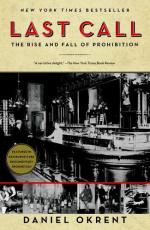|
This section contains 515 words (approx. 2 pages at 300 words per page) |

|
After Franklin Roosevelt accepted his party's nomination for president in 1932, he spoke before the Democratic Convention and said, "This convention wants repeal. Your candidate wants repeal. And I am confident that the United States wants repeal. From this date on, the Eighteenth Amendment is doomed!" The response was thundering and the promise brought new converts to the wet cause. Former dry activist John D. Rockefeller Jr. resignedly sent a letter to the New York Times which publicly announced his support of repeal. Industrialist Pierre du Pont and newspaper magnate William Randolph Hearst also added their considerable influence. In fact, Hearst employed his chain of newspapers to preach the pros of repeal.
Nine days after taking office, Roosevelt cut funding for the Prohibition Bureau and asked Congress to modify the Volstead Act's definition of an "intoxicating beverage." Congress speedily complied and agreed on 3.2 percent alcohol by...
|
This section contains 515 words (approx. 2 pages at 300 words per page) |

|




